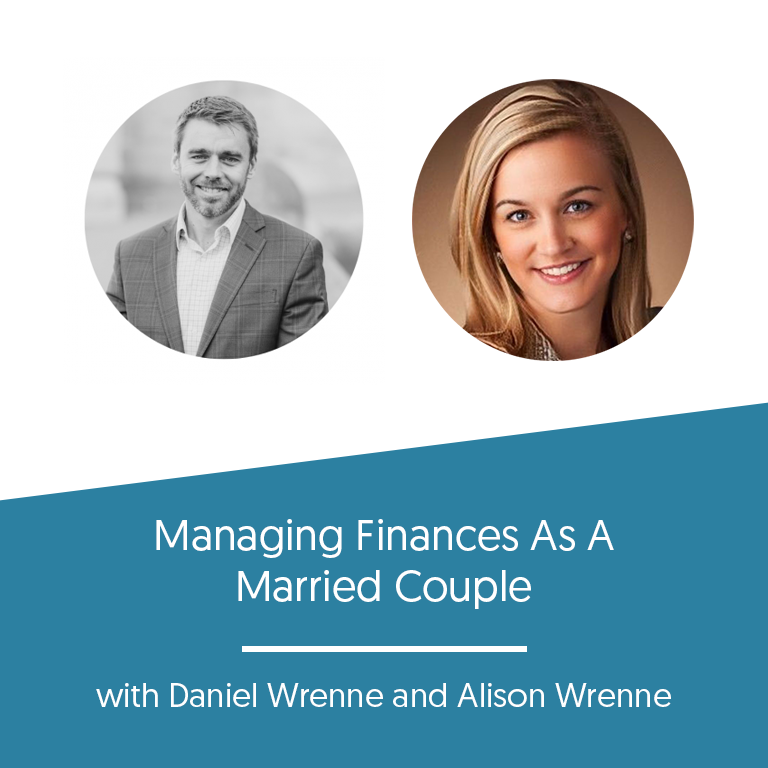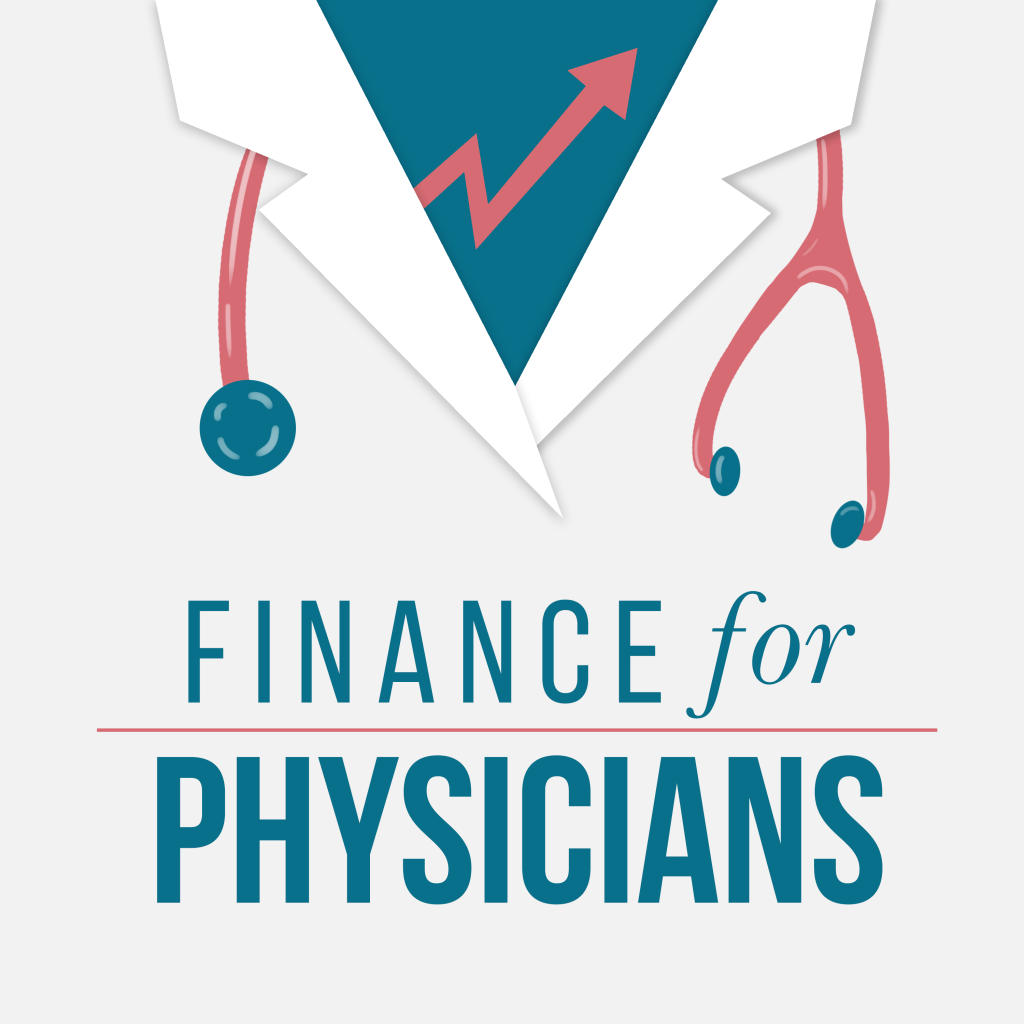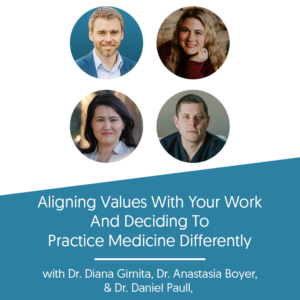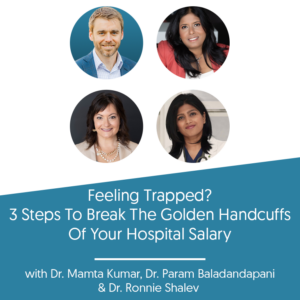When people talk about marriage and finances, they tend to only focus on the positive and optimistic side of the conversation.
However, we have found that studying the potential pitfalls can be just as valuable as narrowing down and focusing on the positive side effects of sharing finances with your significant other.
On today’s episode of the “Finance For Physicians” podcast, Daniel is joined by his wife Alison Wrenne.
Topics Discussed:
- What the ups and downs of financial management are as a family
- How to work better as a team when it comes to communicating financial decisions/struggles
- Why discussing finances can often cause significant hardship and heartache to many loving couples
We’re so excited to present to you this episode and explore the important topic of family finances!
Links:
Contact Finance for Physicians
Full Episode Transcript:
Daniel Wrenne: Hello everyone! I am excited to be with an amazing guest today and that is my wife Alison. Alison works an incredibly difficult job. She stays at home with our three crazy boys, which is a huge job and actually doesn’t pay too well, right Alison?
Alison Wrenne: That’s right. I’m still waiting.
Daniel Wrenne: Yeah. Right. So Alison, thank you for joining me today and being brave to talk about finances on the podcast.
Alison Wrenne: Well, thanks. I’ve never done this before.
Daniel Wrenne: Well, I’m sure you’ll be great. So, money, people love to talk about finances and marriage. That’s a common topic. But they seem to, I think they miss a lot of the really important points. Or they sugar coat it, or they’ll tell you what you want to hear and that’s why you’re great for this sort of topic.
Daniel Wrenne: You’re like the most direct person I know and you’re very honest and there’s no sugar coating. So she’s not gonna tell you what you necessarily want to hear. She’ll tell you really how it is. And on top of that, we have been married 11 years and we’ve talked about money a whole lot. Maybe sometimes too much, I don’t know. And so we got that going for us, right?
Alison Wrenne: Wow, we’ve still, yeah, we’re still here.
Daniel Wrenne: We’re still tracking. And also I’ve had a really good track record with clients so I can share a lot of experience from them. Working one on one with people. You know, there’s been a pretty solid, you know, staying married rate.
Daniel Wrenne: I don’t want to jinx us, but we have a very, very good you know or a very, very low or non-existent divorce rate. So I think this should be a good conversation. We’re gonna be talking about money and how we manage money as a couple, and hopefully we can get into some of the experiences we’ve had and hopefully you’ll gain a little bit from it.
Daniel Wrenne: So, Alison, I wanted to start with just money is a hot topic or can be a hot topic. I don’t know if it has to be, but I’m sure you’ve heard of like money’s the number one cause of divorce and I’m just curious of your thoughts on that. Like why is money mentioned as a the number one cause of divorce so often?
Daniel Wrenne: What’s the deal with that?
Alison Wrenne: Well, I don’t have the answer, but I can see why it is such a problem. You take two people, probably two people who were pretty independent and like you and I, we both had jobs, we had our own finances, we had our own homes. You get married and all of a sudden you’re combining that.
Alison Wrenne: At first, personally, I didn’t find that too difficult. I think that became a little more difficult when we had kids and I stayed home. I think it’s also one of those things that’s really easy to not pay attention to. Like nobody like wants to sit down on a Friday night like and have a date and like let’s go over budget. Like that’s super hot. Like nobody wants to do that.
Daniel Wrenne: I’m the only person that wants to do that.
Alison Wrenne: Well, that’s not normal. I think that what to me, I guess an analogy would be like your finances or your financial health is kind of like your weight. Like nobody wants to get on a scale, but like if you like don’t get on a scale for seven years, you’re probably gonna get on there and not like the number. So to me, even though it’s not like a fun, like I’m not sure, I would call like finance is a fun topic, but I think when your finances are out of control or ignored.
Alison Wrenne: I think the stress that that puts on a marriage is very, very high. I don’t think it matters how much money you make. I mean, if you can’t live within your means, and come to an agreement with your spouse about what that looks like, you’re gonna have some big fights.
Daniel Wrenne: Yep. And I don’t think, I think money is just like the end result. I think really the reason is typically lack of trust or lack of communication or planning ahead or thinking about these things. Like the money itself, it does add pressure like you’re saying, it’s gonna add pressure, but the pressure gets created because there’s no plan or nobody’s thinking ahead or like you’re spending above your means which, you know, somebody needs to make a plan to not spend above your means or there’s not a lot of trust. So, you know, maybe finances highlight a lack of trust and we’ll talk about, I think some of those examples today of like.
Alison Wrenne: Well I do, I was thinking before we hopped on here, I was trying to think what do I think the most important thing about finance and marriage is?
Alison Wrenne: And I think it comes down to trust and respect. Like, do you trust your spouse? Because if you don’t, I mean, I don’t know to tell you, but if you can’t trust that person, you know you’re gonna have some pretty big problems. I think, if you can trust the other person. But I think, I guess before that, I think you have to have, if you don’t have the same values as your spouse or what’s important to you for money, or what money allows you to do. I think you have to get on the same page with that and like, and actually be on the same page.
Alison Wrenne: Just not be like, “Oh yeah, you know, blah, blah, blah.” Like you’ve gotta really think about what you want money to allow you to do and what you wanna do with your money because it’s a limited resource. So it’s like how are we going to decide as a couple about what matters most to us? And then trusting the other person that on a day to day basis, you’re making decisions on what you say actually matters to you.
Daniel Wrenne: Yeah. That’s a bunch of stuff that’s like, you know, trust and respect is I agree like necessary and I agree like I don’t, I don’t know what to say if that’s not there.
Alison Wrenne: Yeah. I guess you just have to work on building, building trust. You gotta build up that you don’t feel like you have it.
Daniel Wrenne: Right. It’s not to mean that like that’s like you’re screwed. It’s like you can build trust or build it back or you know, gain respect. And so that’s kind of its own thing. Once you have solid trust or assuming your trust is there and you have good respect, that doesn’t automatically mean you’re good. Right? Because I know lots of people that have that and are struggling.
Alison Wrenne: No, but I think that’s where you have to start is saying, “Do we really care about the same things? Do we show with our money that we care, you know, that these are the things we care about? And trusting the other person.
Alison Wrenne: I think you have to have a plan, like I think you know like budget’s not like a super sexy word, but I think you need a budget because I think most people do not know myself included where their money goes on a day to day basis. Like for me, it is helpful to have a budget see where the money’s going, seeing what categories are chronically over which ones you’re doing well on.
Daniel Wrenne: I’m curious about the values thing cuz that’s huge too. Some people might have solid trust and respect but to me that’s kind of like the second layer of importance. It’s like what’s most important to you?
Daniel Wrenne: Are your values on the same page or do you talk about ’em, or are you kind of like creating them or tweaking them as a couple? So, as a financial planner we get to like ask people what their values are. It’s important to understand what’s most important and like where you want to go in life, cuz that’s what the foundation of a plan is.
Daniel Wrenne: And so we get to ask people that. And I’ve learned just from experience, most people aren’t clear on what’s most important or they haven’t like thought about it or they’re like I’ve never really sat down to talk about what’s most important. I think for us though is a couple like maybe it’s cuz I’m a financial planner and I talk about this kind of stuff regularly but it seemed like we were like lock on values from the get go. What are your thoughts on that? There’s little small things here and there.
Alison Wrenne: Yeah, I mean, I think you and I had a lot of conversations before we got married.
Daniel Wrenne: Tell them about our first date, please. Just briefly.
Alison Wrenne: Well.
Daniel Wrenne: What did I ask you on our first date?
Alison Wrenne: Let say on our first date? One of the funniest thing, one of the funnier things you asked me was what my five year plan was, right? I did not have a five year plan then, I do not have a five year plan now. I think that plays into knowing your strengths and knowing your partner’s strengths.
Alison Wrenne: Daniel obviously is very financially savvy and handles most of our long term things. I handle a lot more of the kids’ expenses, the daily expenses, the grocery expenses, home repairs, things like that, like I think one thing you can do is you’ve gotta trust the other person like that I know that you’re handling it. I’m not saying we don’t sit down and talk about our long term plan, and I like to understand what’s happening, but if you naturally fit in a role, one better than the other, you know, sometimes it’s good to kind of divide those things up and not have one person doing everything and the other person being clueless. But we just have kind of naturally gone into those roles, I think from what you know what we spend a lot of time doing.
Daniel Wrenne: Yeah so we got the trust and respect, we got values and making sure we’re clear on what’s most important. And then you mentioned money as a tool basically it’s, is what you were saying is like understanding.
Alison Wrenne: Yeah I mean.
Daniel Wrenne: How you want to use money as a tool. A lot of people view money as the end goal.
Alison Wrenne: Right, I think, well that gets into a, that could get into a very long discussion.
Daniel Wrenne: But like as a couple, like understanding how you feel about that particular topic is probably a good starting point.
Alison Wrenne: Like do you wanna be rich to be rich because you think if you’re rich or life is easy? I think a lot of people think that, I think I fortunately had parents in a childhood where finances and savings and investment. I mean, I thought it was normal because that’s your childhood. But like I look back and I think I probably had a little more financial understanding than the average person just because it was talked about.
Alison Wrenne: It was talked about. I guess I was kind of taught that I need to work hard, save your money and help other people. But I think I also taught that, you know, a lot of your blessings, you’re blessed by God to be a blessing to other people. So to me, yeah, I would love to like drive a brand new car and have super nice clothes and going super, super nice vacations.
Alison Wrenne: But like to me, is that using your money well? And to some people maybe the answer is yes to me, “no.” Like to me, supporting our church and being involved in community or as well as our children’s education and our home is important to me as well as, you know, what I feed my children, things like that. I think you have to decide as a couple, and I’m not saying one’s right and one’s wrong, but I think you have to decide as a couple. Where you want your money to go based on what matters to you.
Daniel Wrenne: Yeah. And that’s why values are by far the most important thing. Like you have to understand what values are as a couple and make sure that’s discussed and you know, even revisited over time because ultimately that’s what it comes down to you’re using money as the tool to like move closer to those.
Daniel Wrenne: And when there’s a conflict that in itself can be the issue is when there’s a conflict in values. One person’s using money to kind of move towards them, and then the other person is doing the same thing, but they’re not on the same page with the values.
Alison Wrenne: Yeah. I mean, I think that’s a big thing. And I think it’s the kind of things people don’t think to sit down and talk about because we’re all really busy. Life’s crazy, especially if you have little kids and it’s something that’s easy to slip through the cracks. I guess to me, I also see money as a tool to do the things that I want to be able to do.
Alison Wrenne: I want to be able to plan our family vacation and know that it was planned and budgeted for. And not gonna end up as some huge expense we didn’t plan for, and now we’re fighting about it and there’s credit card debt and all that. To me, I think you’re better off to sit down with your spouse for 10 minutes and say, “Hey, like let’s look ahead at the next year and think what do we wanna do? And you know, like we wanna take our kids skiing.”
Daniel Wrenne: It’s not cheap to go skiing, is it Alison?
Alison Wrenne: Right. No, it’s not. Especially with little kids. But that’s something that’s really important to us is to we both love to ski. We want the kids to be good skiers. And so like to me, yeah, I’d rather drive my 2012 Honda Odyssey with no car payment and take the ski trips I wanna take and that’s fine.
Alison Wrenne: And someone else has different priorities for their money, and that’s fine. But I’m on the same page with my spouse about what those priorities are. And for us, we wanna be able to take trips and we don’t really, if you saw our cars, you would probably realize we don’t really care about what car we drive. We’d rather you know, take a great trip out west and take our kids skiing.
Daniel Wrenne: Yeah. that’s where you get, I mean, once you have the values set and you know, you’re kind of on the same page with your using the money as the tool to kind of make progress towards them, then it’s just about like execution. Like how are you, what are the steps you’re taking?
Daniel Wrenne: And that doesn’t always go well. It rarely goes perfectly, but like that’s were like you know, the budget and the planning and the tactical stuff comes in. It’s like, is our money doing what we want it to do? I think a lot of times people struggle with that too. It’s all these areas are like independently challenging in different ways.
Daniel Wrenne: It’s like, you know, you have to get in the weeds every once in a while. I know we talk about money. I always bring my spreadsheets. You kind of get on me about my spreadsheets. You’re like put the spreadsheets away. But as we approach, you know, discussions, I always have my spreadsheets with me, but like money discussions, it seems like they oftentimes like get into the weeds first.
Daniel Wrenne: I don’t know. What’s the wrong way to start to talk about money? I have my idea of what that might be based on our conversations, but I’m curious what your thoughts are?
Alison Wrenne: I think the wrong way to start is an accusatory way. Like you’re, why we have this much credit card debt and it’s because you bought this and you have this and you have this.
Daniel Wrenne: But that’s, that’s the worst.
Alison Wrenne: I think that’s definitely the wrong way.
Daniel Wrenne: Why don’t you get a job?
Alison Wrenne: Yeah. Like work more, you know, spend less, or I’m having to work this much because you spend this. I’m glad that you don’t do that to me. I hope I don’t do that to you. I think that probably will solve nothing in the long term and just make you resentful and make you never wanna talk about money.
Daniel Wrenne: Yeah. But there are ways I’ve brought up, I know I’ve brought up things, not exactly like intentionally being like pointing fingers like quit spending money but I’m like, “Oh, I got the credit card statement in the mail today, and I’m like what’s this transaction Alison on, blah, blah, blah, blah…”
Daniel Wrenne: Yeah. I mean that’s probably not like the a terrible, that’s not like as bad as the example you gave, but I’m sure that’s not the right way to.
Alison Wrenne: Well, yeah. I mean, I remember I have specific example.
Daniel Wrenne: What is that?
Alison Wrenne: Painting. It’s a painting, but I bought for the dining room. You were like, “What is this store?” And I was like, “Oh.” And you were like, “Okay, that is at the level of dollar amount that we need to have a discussion about before you buy it.” And I was like, “Oh, I’m sorry.”
Alison Wrenne: “Okay. You’re right. Like that’s, you know, that’s an item that needs to be discussed.”
Alison Wrenne: Do I call Daniel and say, “Hey, I’m paying 799 for organic raspberries.” No. But you know, like, we need to have a piece of furniture recovered and I’ll pick out a fabric and I’ll get an idea of what it costs. And that is the kind of item, line item that we have decided as a couple that we’re gonna talk about those things before.
Alison Wrenne: Just like, you know, if Daniel went out and thought but $1,500, you know, ski boots and skis. That’s the kind of thing that we, that we need to be on the same page about. But I do think, I mean, I know it’s no fun, but I do think if you can sit down with your spouse and come up with like a realistic budget, and that it’s like, cause I don’t, I don’t wanna be micromanaged.
Alison Wrenne: I mean, I do probably 99% of the bind for our family, and I have no interest in being micromanaged by anyone and by Daniel. So like, to me, let’s sit down. As a couple, let’s decide what we think is a reasonable amount that groceries are and what we think is a reasonable amount of kids’ activities or babysitters.
Alison Wrenne: And if you’re staying within or near those numbers, I think it takes stress off because there’s nothing to fight about. I mean, if you set, you know.
Daniel Wrenne: You’re on target.
Alison Wrenne: A kid’s activity. Yeah. If you’re on target, then you’ve agreed on the numbers, then I’m not gonna say like, “Oh, I see you went to Starbucks every day this month.”
Alison Wrenne: But like if you’ve both talked about that line item, I mean, that’s just a random example or you know, if he’s like, “Oh, are those new pants? Yeah, they’re new pants and they fit in my shopping budget, so you know”
Daniel Wrenne: Back up off me.
Alison Wrenne: It works for both of us. Like, you know what I mean? But I think if you’re just like flying blind, I would think that would probably lead to more arguments, unless you’re both just like huge, huge penny pinchers and never buy anything.
Daniel Wrenne: That causes its own set of problem. I mean, there’s a different set of problems that can happen.
Alison Wrenne: I mean, you’re gonna have, like you take two adults, you put ’em together, you start sharing your finances. Yeah, there’s gonna be disagreements and fights and discussions, but like hopefully you get on the same page because you talk about what you want in the future.
Alison Wrenne: Yeah. So like, when our kids are older, I want to be able to travel more. I want to be able to go see these places and do these things. So what do we say now that we need to do to make that happen? Because you can’t have it all. I mean, you’ve gotta decide what you wanna spend your money on. I mean, I don’t think there’s like, you know, you’re gonna spend it either way. I think it’s probably better to have a plan if you’re gonna, if when you’re doing it.
Daniel Wrenne: Yeah. But it’s hard to combine. It’s hard to be, I mean, we’re all selfish, so you know, you gotta work on that one. And what do you think about separate finances? As some people, I think it’s very, that you get down that path, you’re like, well, this is hard. Like this is hard. We’re hard to, so it’s like, especially when post spouses are in income. It’s like, well, it’s just separated.
Alison Wrenne: Well, I think if you’re married, your finances should be combined. .
Daniel Wrenne: I dunno why I asked you that question. I dunno why I asked you that question. Cause I know exactly what you think and, but I think it’s an important thing to.
Alison Wrenne: I think if you are married, I mean to me, marriage is when two people become one. So you’re two people and now you’re one entity and you’re a family. Even if you’re a couple with no kids, you are.
Daniel Wrenne: Tie the knot you.
Alison Wrenne: Yeah, you’re together and to me, I can only imagine the resentment that I would feel if we had separate finances. Well, first off, I was gonna say at home mom for nine and a half years, but even if I had it.
Daniel Wrenne: That wouldn’t work.
Alison Wrenne: It’s like well, who? It’s like what are we split the groceries down the middle. Like I dunno. To me, like or who’s paying for the kids’ soccer? Like who’s paying for cleats? Who’s paying for the electric?
Daniel Wrenne: I’m not paying for it.
Alison Wrenne: Yeah. Like to me, I would actually think that would cause more problems in sharing your finances, but I don’t know cause I’ve ever done it.
Daniel Wrenne: But I could see how that.
Alison Wrenne: I can see the appeal, but like it’s ripe for like, I mean, it’s lack of transparency, which is lack of trust. I mean, there’s it’s ripe for like.
Alison Wrenne: Right. I do think that if you want separate finances and maybe there’s a specific reason you want separate finances, maybe you saw horrible example of combined finances, but to me it’s like you have to, you gotta trust this person and if you don’t, then you, you know, maybe you need to talk about how you can, can’t trust each other. I mean, I’m sure there’s been many times that I’ve been irresponsible with money or maybe you were annoyed by something I bought or did or spent, but I think you have to work through those things because that’s, you know, part of marriage.
Daniel Wrenne: Yep. I wanted to go back to the budgeting thing before I forget it. The way that we’ve kind of evolved in our conversations about like budgets particularly. First of all like, I don’t like budgets. Most people don’t love budgeting. Every once in a while, there are people that enjoy budgeting, but I think most people hate budgeting or dislike it, and but I have an appreciation for it. So, what has been frustrating for me has been like the minutia detailed stuff that’s unnecessary to track. And Alison has helped me to realize some of these things too. But, one suggestion I would throw out especially for those of you that are like doing the planning part of the equation is building in margin into your budget.
Daniel Wrenne: So that’s what I did a while ago. It saved us a lot of like just annoying frustrations with little things. I just built in like a 10% margin into our budget so that it wasn’t always going over cuz it was frustrating for me when it always went over and but the problem is in a budget, there’s just these little things you don’t think about that will always mess your budget up. So, most of you listening have, you know, as physicians you’re gonna earn high income and you know, that’s a nice benefit of having a higher income is you don’t have to watch every penny necessarily, but you don’t want to go the complete other direction. So Alison is used this approach where she kind of like zeros in on categories, which I think is really good.
Daniel Wrenne: Cuz like what’s the point of writing down your mortgage payment every month. And that’s where a lot of people start with budgeting. They’re like, “Oh, well I got a mortgage, I got utilities. I got a cable bill, I got internet. I got what’s the insurance premium divided by, blah, blah, blah.” And they go through all the fixed things.
Daniel Wrenne: And then the variable like kinda stuff is they’re like, “I don’t know. Well, let’s a guess.” You know, they have no idea. Your approach is more like, “I don’t care about the fixed stuff, right? Like talk through that.”
Alison Wrenne: Right, okay. So the way that I approach budgeting. Well first I have to preface this by, it’s not that I don’t care about the fixed expenses. Daniel, and I know what our fixed expenses are. We’ve gone over our fixed expenses and we know our fixed expenses are reasonable and responsible.
Daniel Wrenne: Like, yeah, such a good disclaimer.
Alison Wrenne: So that, that’s the first thing. So, If your house is too big, maybe you need to sell your house, but you know, we have our fixed expenses. We know what they are. It’s not like we ignore them, but I don’t need to track. What my water bill is every month, because at the end of the day, I can’t really change what my water bill is. So I, for me, everybody’s different. For me, I like to track what I view as discretionary items, so that’s everything. The things that I feel like I have control over. Everything from like groceries to babysitters, to kids activities, to school, to dining out, to entertainment, to shopping, to clothing, yada, yada, yada.
Alison Wrenne: All the things that I actually, I have control over because like, I don’t, I mean, why would I sit there and track what my, you know, Columbia gas payment is in the winter. If you know that you can afford your house and you know you’re in, if your fixed expenses are okay.
Alison Wrenne: So for me, I think it’s better to track our discretionary income. And I keep those categories kind of broad because that works for me. Like I don’t want to have things super, super, broken down. I’m not tracking things by kids. I’m not, you know, I’m tracking like a total grocery budget for the month. A total dining out and, you know, entertainment.
Alison Wrenne: And a total kids’ activities. I mean, this summer the kids’ activities were like, that one and was through the roof. But at least.
Daniel Wrenne: Like that was surprising.
Alison Wrenne: We knew it was through the roof and it’s like, “Okay, well we know why it’s through the roof. And you know, we even said we probably should have set a budget for summer camps and things like that beforehand, but I think as long as you’re in the range, you know, like but there’s always gonna be stuff that comes up. I mean, I a couple months ago ran, you know, had a flat tire, ran over a nail. I thought I could get it patched.
Alison Wrenne: Well I couldn’t cause my tire was too low. And then, you know, here I am with four brand new tires and I was kinda annoyed about that cause I felt like it blew my budget.
Daniel Wrenne: But that’s like a neat, you gotta do that kind of thing.
Alison Wrenne: Yeah. And it happens and you at least I know that month. It’s like, oh, well. And sometimes I have it like an Excel spreadsheet and sometimes I’ll make a little note like, you know, car tires or kids tuition or whatnot.
Daniel Wrenne: Yeah. Well, lots, lots of good nuggets. Before we wrap up and call it a day, I wanted to kind of talk about one more thing. As far as like regularity of, most people aren’t like me and they don’t love talking about money.
Daniel Wrenne: Most people probably dislike it, I don’t know. But, what do you.
Alison Wrenne: But you don’t like, you don’t like talking about how much things cost to get fixed.
Daniel Wrenne: No, that is true. That is true. I don’t like hearing.
Alison Wrenne: You’re more of a long term. You’re a long term.
Daniel Wrenne: That’s right. I’m a long term planner. Alison is a short term planner, so that’s a good combo, I think. But, what do you think is a good frequency of, I mean, you gotta talk about things when, you know, stuff blows up. Like when you have to replace all your tires or, I like how you said, you know, talked about setting thresholds for like this, we gotta talk now because this thing is happening, but like outside of those things, what do you think is a good like frequency for conversations about money with couples?
Alison Wrenne: You and I used to do it a lot more where we would check in like monthly, which I do think is helpful.
Daniel Wrenne: Do you remember my monthly emails?
Alison Wrenne: I do. I liked your monthly email .
Daniel Wrenne: Well, it got to feel like, it felt like the same thing. I’m not great at long term repetitive tasks, by the way. But like the email started to feel like the same thing over and over again.
Alison Wrenne: I mean, I feel like I am actually the one that’s like when do you have 10 minutes? We need to sit down and talk about money. I mean, I feel like I probably do that more than you, and maybe it’s because I don’t know what’s happening long term. A little bit more interest in, but I could give you like, and it’s not like, I’m not trying to scare people. Like you take, you say the end of the month, you’re gonna take five to 10 minutes to look, to look at how you’re doing. I think it’s good. And then, you know, I think I like to run big purchases by Daniel. I mean, you know, he’s not.
Daniel Wrenne: And I always say, No.
Alison Wrenne: You know, I’m not gonna like go out and, you know, but I mean, I know at what range I need to run something by Daniel.
Alison Wrenne: Daniel typically doesn’t need to run anything by me, cuz he never buys anything but.
Daniel Wrenne: True.
Alison Wrenne: But, I think it’s good. I’ve got, you know, there’s a lot of reasons. I think it’s good. I think it’s good. I hope it keeps you on the same page. I also think that, which would be a whole other podcast about how to honor and respect your spouse with money in front of your children. And you know that I’m never, you know, I would never be like buy something for the kids and be like, “Don’t tell daddy.” Like, I mean, unless it’s like his birthday present or something. But, I mean that’s probably a whole other thing.
Daniel Wrenne: Yep.
Alison Wrenne: But I think, I think that respecting your spouse, respecting the gifts that you’ve been given, trying to use your money wisely, I think it can be a really short conversation, but I think probably one that needs to happen pretty frequently because I think what happens is if you don’t, you get in a situation that you didn’t want to expect to be in, and now you’re, you know, probably both ticked at each.
Daniel Wrenne: Yep. Yeah, I think monthly is a good frequency. Do at least have some little conversation, even if it’s just a check. I think I just thought of one other thing. The little, personal financial organizer. So Alison regularly will tell me, she’s like, “I have no idea where all our stuff is.” because I’m the one that handles like the account, like the investments and the accounts and then the long term planning.
Daniel Wrenne: And she does like the day to day stuff, so she’s always like, “What’s, I don’t know where everything is and da, da da.” And one thing I think that’s been helpful is I give her like a, I guess a personal financial organizer is what I would call it every year or so, and I just gave you an updated one last month I think. It has. So it’s basically all of our.
Alison Wrenne: It’s like a one. You’re making it sound more scary than it is. It’s a one, it’s a one page sheet of paper. Yeah. Not like a dossy. It’s a one, it’s a one page sheet of paper. I’m a paper person. I have something happened to Daniel. The last thing I wanna be doing is trying to log on a single.
Alison Wrenne: Like a piece of paper. It’s in our fire safes box.
Daniel Wrenne: And it took me a lot of time to boil that sucker down to one page.
Alison Wrenne: But it has like every account, well you can explain what it has, but it’s a sheet of paper.
Daniel Wrenne: Yeah. It’s got all of our account balances, assets and debt, you know, stuff that we own and, and stuff that we owe.
Daniel Wrenne: And then it lists balance in the date and then the contact person. And then it has insurances summarize, and then like life insurance and all the insurance, like life insurance, and it’s kind of like the, we get into major situation document. It’s like something happens, somebody pulled that thing out.
Daniel Wrenne: Plus it’s also like a state of the union, kind of like, here’s a report on how things are going, if you’re curious on it. So, I can, I’ll link to that template in the show notes in case you guys. I’m very proud of it.
Alison Wrenne: Well, and it’s important and it’s something nobody wants to think about, but I mean, you know, things happen overnight and somebody gets sick overnight or hopefully nothing worse happens, but you wanna have a spot where, you know, where the things are if you need them.
Daniel Wrenne: And who you need to call and all that stuff. Yeah.
Alison Wrenne: And that just makes me, you know, it’s kind of like a peace of mind knowing like, “Okay, I know I’ve got everything I need. It’s in this one spot. I know that Daniel updates it pretty regularly and it’s better to have it and not need it than wish you had taken the time to do it.”
Daniel Wrenne: Yeah. Now, if you work with us one on one, you can reach out to us and we’ll send you that document. Yeah and so some of you’re listening too but we can prep it for you. You don’t have to because we already track all that stuff so.
Alison Wrenne: Well, there you go.
Daniel Wrenne: Yep. Yep. But anyway, Well, it’s been fun talking money with you, babe.
Alison Wrenne: Thanks babe.
Daniel Wrenne: And, we’ll see everyone next time. Thanks, Alison.










